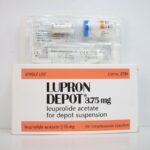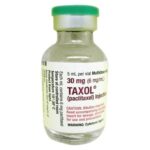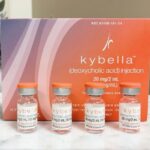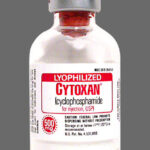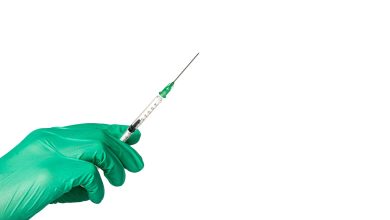Lupron: Uses, Dosage, Side Effects, How it works
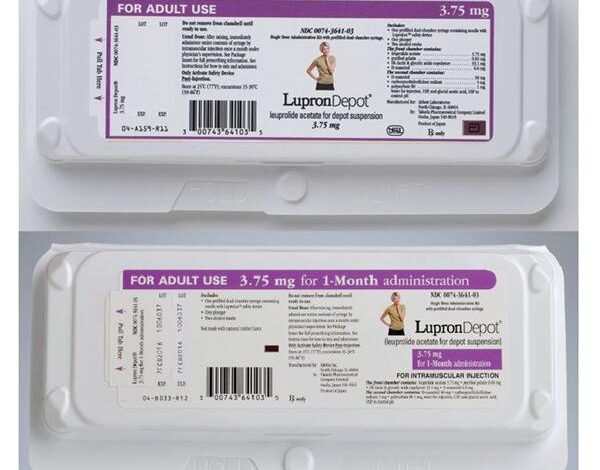
Lupron Depot is a brand of Leuprolide, used to treat the symptoms associated with advanced prostate cancer. Leuprolide injection is used in children 2 years of age or older to treat central precocious puberty (CPP; a condition causing girls [usually younger than 8 years of age] and boys [usually younger than 9 years of age] to enter puberty too soon, resulting in faster than normal bone growth and development of sexual characteristics).
Lupron Depot is used alone or with another medication (norethindrone) to treat endometriosis (a condition in which the type of tissue that lines the uterus [womb] grows in other areas of the body and causes pain, heavy or irregular menstruation [periods], and other symptoms). Lupron Depot is also used with other medication to treat anemia (a lower than normal number of red blood cells) caused by uterine fibroids (noncancerous growths in the uterus). Leuprolide injection is in a class of medications called gonadotropin-releasing hormone (GnRH) agonists. It works by decreasing the amount of certain hormones in the body.
How should Lupron be used?
Lupron injection comes as a long-acting suspension that is injected intramuscularly (into a muscle) by a doctor or nurse in a medical office or clinic and is usually given once a month (Lupron Depot, Lupron Depot-PED) or every 3, 4, or 6 months (Lupron Depot-3 month, Lupron Depot-PED-3 month, Lupron Depot-4 month, Lupron Depot-6 Month).
What special precautions should I follow?
Before receiving leuprolide injection,
- tell your doctor and pharmacist if you are allergic to leuprolide, goserelin (Zoladex), histrelin (Supprelin LA, Vantas), nafarelin (Synarel), triptorelin (Triptodur, Trelstar), any other medications, or any of the ingredients in leuprolide injection. Ask your pharmacist for a list of the ingredients.
- tell your doctor and pharmacist what other prescription and nonprescription medications, vitamins, nutritional supplements, and herbal products you are taking or plan to take. Be sure to mention any of the following: certain medications for irregular heartbeat such as amiodarone (Cordarone), disopyramide (Norpace), procainamide (Procanbid), quinidine, and sotalol (Betapace, Betapace AF, Sorine); buproprion (Aplenzin, Forfivo, Wellbutrin, in Contrave); medications for seizures; oral steroids such as dexamethasone (Hemady), methylprednisolone (Medrol), and prednisone (Rayos); and selective serotonin reuptake inhibitors (SSRIs) such as citalopram (Celexa), escitalopram (Lexapro), fluoxetine (Prozac, Sarafem, in Symbyax), fluvoxamine (Luvox), paroxetine (Brisdelle, Paxil), and sertraline (Zoloft). Your doctor may need to change the doses of your medications or monitor you carefully for side effects. Many other medications may also interact with leuprolide, so be sure to tell your doctor about all the medications you are taking, even those that do not appear on this list.
- tell your doctor if you have unusual vaginal bleeding. Your doctor may tell you not to use leuprolide injection.
- tell your doctor if you or anyone in your family has or has ever had osteoporosis (condition where bones are thin and more likely to break); if you have a history of drinking alcohol or using tobacco products for a long period of time; or if you have or have ever had depression, seizures, brain tumors, cancer that has spread to the spine (backbone), diabetes, urinary obstruction (blockage that causes difficulty urinating), blood in your urine, a prolonged QT interval (a rare heart problem that may cause irregular heartbeat, fainting, or sudden death), cerebrovascular disease (clogging or weakening of the blood vessels within the brain or leading to the brain), heart disease, or a low level of potassium, calcium, or magnesium in your blood.
- you should know that leuprolide is not to be used in women who are pregnant, can become pregnant, or are breastfeeding. Tell your doctor if you are pregnant, plan to become pregnant, or are breast-feeding. Your doctor may perform a pregnancy test to be sure that you are not pregnant when you begin receiving leuprolide injection. You will need to use a reliable nonhormonal method of birth control to prevent pregnancy while you are receiving leuprolide injection. Talk to your doctor about the types of birth control that are right for you, and continue to use birth control even though you should not have regular menstrual periods during your treatment. If you think you have become pregnant while receiving leuprolide injection, call your doctor immediately. Leuprolide injection can harm the fetus.
What special dietary instructions should I follow?
Unless your doctor tells you otherwise, continue your normal diet.
What side effects can this medication cause?
Leuprolide injection may cause side effects. Tell your doctor if any of these symptoms are severe or do not go away:
- tiredness
- hot flashes (a sudden wave of mild or intense body heat), sweating, or clamminess
- breast tenderness, pain, or change in breast size in both men and women
- vaginal discharge, dryness, or itching in women
- spotting (light vaginal bleeding) or menstruation (periods)
- decrease in size of testicles
- decrease in sexual ability or desire
- swelling of the hands, feet, ankles, or lower legs
- pain, burning, or tingling in the hands or feet
- pain, burning, bruising, redness, or hardening at place where injection was given
- change in weight
- muscle or joint pain
- runny nose, cough, sore throat, or flu-like symptoms
- fever
- stomach pain
- constipation
- headache
- acne
- depression
- unable to control emotions and frequent mood changes
- nervousness
- general feeling of discomfort or uneasiness
- difficulty with memory
Some side effects can be serious. If you experience any of these symptoms, call your doctor immediately:
- itching, rash, or hives
- difficulty breathing or swallowing
- pain in the arms, back, chest, neck, or jaw
- slow or difficult speech
- dizziness or fainting
- weakness, numbness, or inability to move an arm or leg
- bone pain
- painful, frequent, or difficult urination
- blood in urine
- extreme thirst
- weakness
- dry mouth
- nausea
- vomiting
- breath that smells fruity
- decreased consciousness
- sudden headache
- blurred vision
- vision changes
- difficulty moving eyes
- drooping eyelids
- confusion
- seizures
Leuprolide injection may cause a decrease in the density of your bones which can increase the chance of broken bones. Talk to your doctor about the risks of using this medication and to find out what you can do to decrease these risks.
In case of emergency/overdose
In case of overdose, call the poison control helpline at 1-800-222-1222. Information is also available online at https://www.poisonhelp.org/help. If the victim has collapsed, had a seizure, has trouble breathing, or can’t be awakened, immediately call emergency services at 911.
What other information should I know?
Keep all appointments with your doctor and the laboratory. Your doctor will order certain lab tests and take certain measurements to check your body’s response to leuprolide injection. Your blood sugar and glycosylated hemoglobin (HbA1c) may also be checked regularly.
Ask your pharmacist any questions you have about leuprolide injection.
It is important for you to keep a written list of all of the prescription and nonprescription (over-the-counter) medicines you are taking, as well as any products such as vitamins, minerals, or other dietary supplements. You should bring this list with you each time you visit a doctor or if you are admitted to a hospital. It is also important information to carry with you in case of emergencies.

